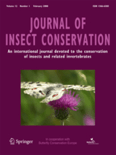
JOURNAL OF INSECT CONSERVATION
Scope & Guideline
Advancing Insect Conservation for a Sustainable Future
Introduction
Aims and Scopes
- Biodiversity Assessment:
Focus on the documentation and assessment of insect diversity across various ecosystems, highlighting the need for comprehensive inventories and monitoring programs. - Conservation Strategies:
Research dedicated to developing and evaluating conservation strategies for threatened insect species, emphasizing habitat management and restoration efforts. - Ecological Interactions:
Exploration of the ecological roles insects play in their environments, including their interactions with plants, other animals, and their response to environmental changes. - Impact of Climate Change:
Investigation into how climate change affects insect populations and their habitats, providing insights into adaptive management and future conservation needs. - Citizen Science and Public Engagement:
Promotion of citizen science initiatives aimed at involving the public in insect monitoring and conservation efforts, reflecting the journal's commitment to community engagement.
Trending and Emerging
- Climate Resilience and Adaptation:
A growing number of studies focus on how insects can adapt to climate change, including research on phenological shifts and habitat use patterns in response to changing environmental conditions. - Urban Ecology:
Research on how urbanization affects insect populations and community dynamics is on the rise, indicating an increasing recognition of urban habitats as critical conservation areas. - Metagenomics and Molecular Techniques:
The use of advanced molecular techniques, such as metabarcoding, for biodiversity assessment is gaining traction, providing new tools for monitoring insect populations and their interactions. - Community Engagement in Conservation:
There is an emerging trend towards integrating citizen science and public participation in insect conservation efforts, reflecting a broader movement to involve communities in ecological monitoring. - Ecosystem Services:
Research highlighting the role of insects in providing ecosystem services, such as pollination and decomposition, is becoming more prominent, emphasizing their importance in maintaining ecological balance.
Declining or Waning
- Traditional Taxonomic Studies:
There has been a noticeable decline in papers focused solely on traditional taxonomy, as the field increasingly emphasizes integrative approaches that combine genetic, ecological, and conservation perspectives. - Historical Data Analysis:
Research utilizing historical data sets to analyze long-term trends in insect populations has become less frequent, possibly due to a shift towards real-time monitoring and immediate conservation actions. - General Insect Behavior Studies:
Papers focusing on general insect behavior without direct conservation implications or ecological context are diminishing, as the journal prioritizes studies with clear relevance to conservation efforts.
Similar Journals
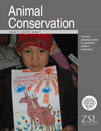
ANIMAL CONSERVATION
Preserving Nature's Legacy, One Study at a Time.Animal Conservation is a prestigious journal that serves as a vital platform for the dissemination of research dedicated to the preservation of wildlife and habitats. Published by Wiley, this journal has established a significant presence in the fields of Ecology and Nature and Landscape Conservation, holding a distinguished Q1 category ranking for both in 2023. With an impressive Scopus rank of #25 in the realm of environmental science, it caters to a global audience keen on understanding and addressing pressing conservation issues. The journal provides researchers, professionals, and students with high-quality, peer-reviewed articles that explore innovative methods and strategies in animal conservation. With its continuous publication since 1998, encompassing a comprehensive range of topics, Animal Conservation is indispensable for anyone aiming to make impactful contributions to the field of ecology and conservation biology.
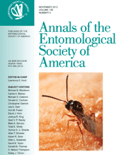
ANNALS OF THE ENTOMOLOGICAL SOCIETY OF AMERICA
Advancing the Frontiers of Insect ScienceANNALS OF THE ENTOMOLOGICAL SOCIETY OF AMERICA is a premier journal dedicated to advancing the field of insect science, published by Oxford University Press. With an impressive impact factor and classified in the Q1 quartile for its category, this journal ranks among the top publications in agricultural and biological sciences, specifically within insect science, positioned at #28 out of 181, indicating its significant influence and high-quality research contributions. The journal aims to disseminate original research, comprehensive reviews, and groundbreaking findings that enhance our understanding of entomology, spanning across ecological, evolutionary, and applied segments. With a consistent publication history since 1938, researchers, professionals, and students will benefit from the wealth of knowledge presented in its pages. Although the journal does not currently offer open access, it remains a vital resource for those seeking to stay at the forefront of entomological research and innovation.
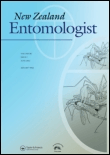
NEW ZEALAND ENTOMOLOGIST
Advancing Entomological Knowledge, One Article at a TimeNEW ZEALAND ENTOMOLOGIST, published by Taylor & Francis Ltd, is a distinguished journal in the field of Insect Science, featuring a rich history dating back to its initial publication in 1952. As a platform for sharing innovative research and critical insights, this journal serves as a vital resource for entomologists and scientists interested in the diverse aspects of insect biology, ecology, and behavior. Although it currently holds a Q4 category in its discipline with Scopus ranking it at the 163rd out of 181 journals, the NEW ZEALAND ENTOMOLOGIST continues to uphold high-quality standards of peer-reviewed articles that contribute significantly to the understanding of insects, particularly within the unique ecosystems of New Zealand. Researchers and professionals are encouraged to submit their findings to enhance the journal's growing repository of knowledge, while students will find a wealth of information to aid their studies and foster their interest in entomological research.
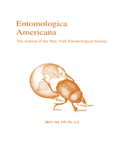
Entomologica Americana
Illuminating the Path of Insect ResearchEntomologica Americana is a pivotal journal in the field of Insect Science, published by the esteemed New York Entomological Society Inc. With its ISSN (1947-5136) and E-ISSN (1947-5144), this journal serves as a critical resource for researchers, professionals, and students dedicated to the study of entomology. Although it is categorized in the Q4 quartile for Insect Science as per the 2023 Scopus Rankings, where it ranks 179 out of 181, it continues to provide valuable insights into various aspects of insect biology, ecology, and conservation. The journal has been actively publishing since its convergence years from 2009 to 2017, and in selected years thereafter, including 2019, 2021, and 2023. Located at the iconic American Museum of Natural History in New York City, Entomologica Americana is a testament to the ongoing exploration and understanding of the insect world that underpins biodiversity and ecosystem health. Although it does not operate under an Open Access model, it offers a vital platform for scholarly communication and the dissemination of research findings, making it indispensable for anyone involved in or entering the fascinating field of entomology.

Alpine Entomology
Bridging Knowledge Gaps in Alpine EntomologyAlpine Entomology is a pioneering open-access journal published by Pensoft Publishers, dedicated to advancing the study of insect science and ecology, with a particular focus on mountainous environments. Launched in 2017 and accessible online, this journal provides a vital platform for researchers, professionals, and students to share their findings and insights in a rapidly evolving field. With its ISSN N/A and E-ISSN 2535-0889, Alpine Entomology has been recognized for its contributions, achieving Q3 category rankings in 2023 across several disciplines, including Animal Science and Zoology, as well as Ecology and Insect Science. Set in Sofia, Bulgaria, the journal exemplifies a commitment to promoting high-quality research and enhancing collaboration among scientists globally. Through its open-access model, it ensures that groundbreaking research is widely disseminated, helping to bridge gaps in knowledge and fostering a deeper understanding of alpine ecosystems and their intricate insect communities.
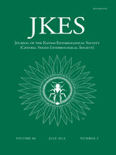
JOURNAL OF THE KANSAS ENTOMOLOGICAL SOCIETY
Bridging Research and Agricultural ImpactJOURNAL OF THE KANSAS ENTOMOLOGICAL SOCIETY, published by the Kansas Entomological Society, serves as a vital platform dedicated to the field of entomology and insect science. With an ISSN of 0022-8567 and an E-ISSN of 1937-2353, this journal has established itself since its inception in 1994, continuing to contribute valuable research up to 2024. Despite its current Q4 categorization in the 2023 Insect Science rankings, it ranks 106 out of 181 in Scopus, representing a significant opportunity for researchers to disseminate their findings in a supportive and engaged community. Although it is not an open-access journal, its commitment to rigorous peer review and relevance in agricultural and biological sciences makes it an essential resource for professionals, scholars, and students alike. The journal's focus on local and regional entomological issues often addresses broader ecological impacts, showcasing the importance of insects in environmental health and agriculture. We invite you to explore the rich tapestry of findings and discussions within this esteemed publication.
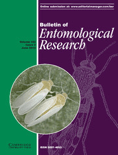
BULLETIN OF ENTOMOLOGICAL RESEARCH
Bridging the Gap Between Insects and Agricultural AdvancementsBULLETIN OF ENTOMOLOGICAL RESEARCH, published by Cambridge University Press, is a prestigious journal that has been at the forefront of entomological research since its inception in 1910. With an impressive track record extending through to 2024, this journal serves as a vital platform for advancing knowledge in various related fields, notably Agronomy and Crop Science and Insect Science, where it ranks in the top quartile (Q2) and maintains a commendable position within the Scopus rankings in its categories. Notably, its contributions also intersect with Medicine in a broader scope, fostering interdisciplinary insights. While access to the journal content is not classified as 'Open Access,' its rigorous peer-reviewed articles are crucial for researchers, professionals, and students seeking to enhance their understanding of entomology and its applications in agronomy and beyond. The journal's impact is reflected in its notable percentile rankings, emphasizing its relevance and influence in the academic community. Located at the heart of the UK, the BULLETIN OF ENTOMOLOGICAL RESEARCH continues to be an essential resource for those dedicated to the study and understanding of insects and their impacts on agriculture and health.

REVISTA COLOMBIANA DE ENTOMOLOGIA
Advancing Insect Science in ColombiaREVISTA COLOMBIANA DE ENTOMOLOGIA, published by the SOC COLOMBIANA ENTOMOLOGIA-SOCOLEN, serves as a vital platform for disseminating research in the field of insect science. With an ISSN of 0120-0488, the journal has established itself as a key resource for entomologists, agricultural scientists, and biodiversity researchers, focusing on the ecology, taxonomy, and behavior of insects within the Colombian context and beyond. Despite its Q4 ranking in 2023, REVISTA COLOMBIANA DE ENTOMOLOGIA strives to enhance its impact within the academic community, offering a space for innovative studies and reviews that aim to advance the understanding of insect-related phenomena. As a publication addressing critical concerns in agricultural and biological sciences, it invites contributions that explore new methodologies and findings relevant to the insect world. Although it does not currently offer Open Access options, the journal's growth from 2004 to 2024 reflects its commitment to evolving with the needs of its readership and contributors, making it an essential reference point for students and professionals alike interested in entomological research.

FRAGMENTA ENTOMOLOGICA
Unraveling the complexities of insect science.FRAGMENTA ENTOMOLOGICA is a prominent peer-reviewed academic journal published by UNIV DEGLI STUDI DI ROMA LA SAPIENZA, focusing on various dimensions of entomology and insect science. With an ISSN of 0429-288X and an E-ISSN of 2284-4880, this journal has embraced an Open Access model since 2006, ensuring that valuable research is widely accessible to the global scientific community. Based in Italy, at the DIPARTIMENTO DI BIOLOGIA ANIMALE E DELL'UOMO in Rome, FRAGMENTA ENTOMOLOGICA is recognized for its commitment to high-quality research, ranking in the Q3 category across multiple categories, including Ecology and Insect Science, in 2023. Its Scopus rankings further underscore its relevance, showcasing its role in advancing knowledge in the fields of Ecology, Evolution, and Insect Behavior. This journal serves as an essential resource for researchers, professionals, and students interested in the intricate world of insects and their ecological roles, fostering academic discourse that bridges theoretical and practical entomological studies.

JOURNAL OF INSECT SCIENCE
Exploring the Intricacies of Insect LifeJOURNAL OF INSECT SCIENCE, published by OXFORD UNIV PRESS INC, stands as a pivotal platform in the field of insect science, offering open-access research since 2001. With an impactful presence in the academic community, this journal spans the convergence of entomology and various interdisciplinary studies, establishing itself in the Q2 quartile for both Insect Science and Medicine (miscellaneous) categories as of 2023. This esteemed journal is recognized for its contributions to the understanding and management of insect biology, ecology, and their implications for agriculture and human health, garnering a Scopus rank of 44 out of 181 in Agricultural and Biological Sciences. The Open Access model encourages wide dissemination of knowledge, making the rich repository of research accessible to a global audience. With ongoing publications until 2024, JOURNAL OF INSECT SCIENCE serves as an essential resource for researchers, professionals, and students seeking to deepen their understanding of the crucial role insects play in our ecosystem.